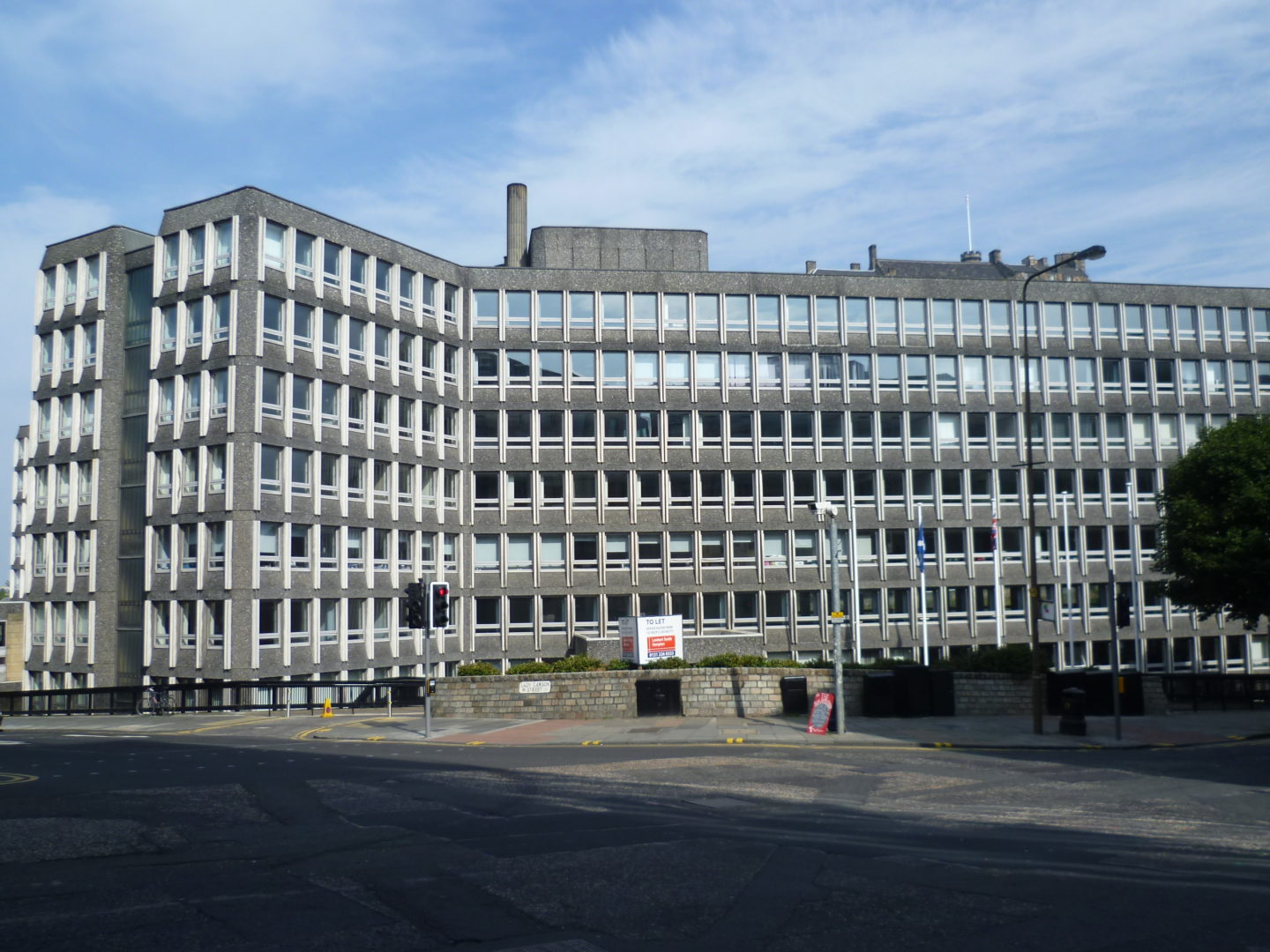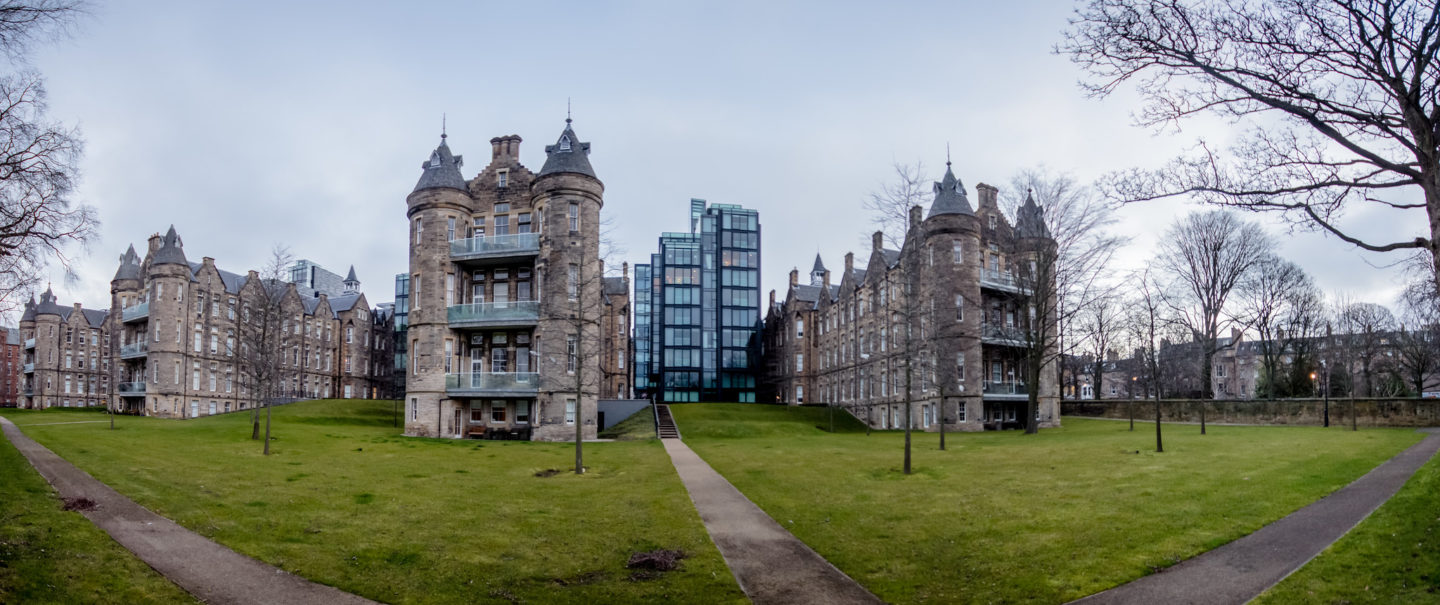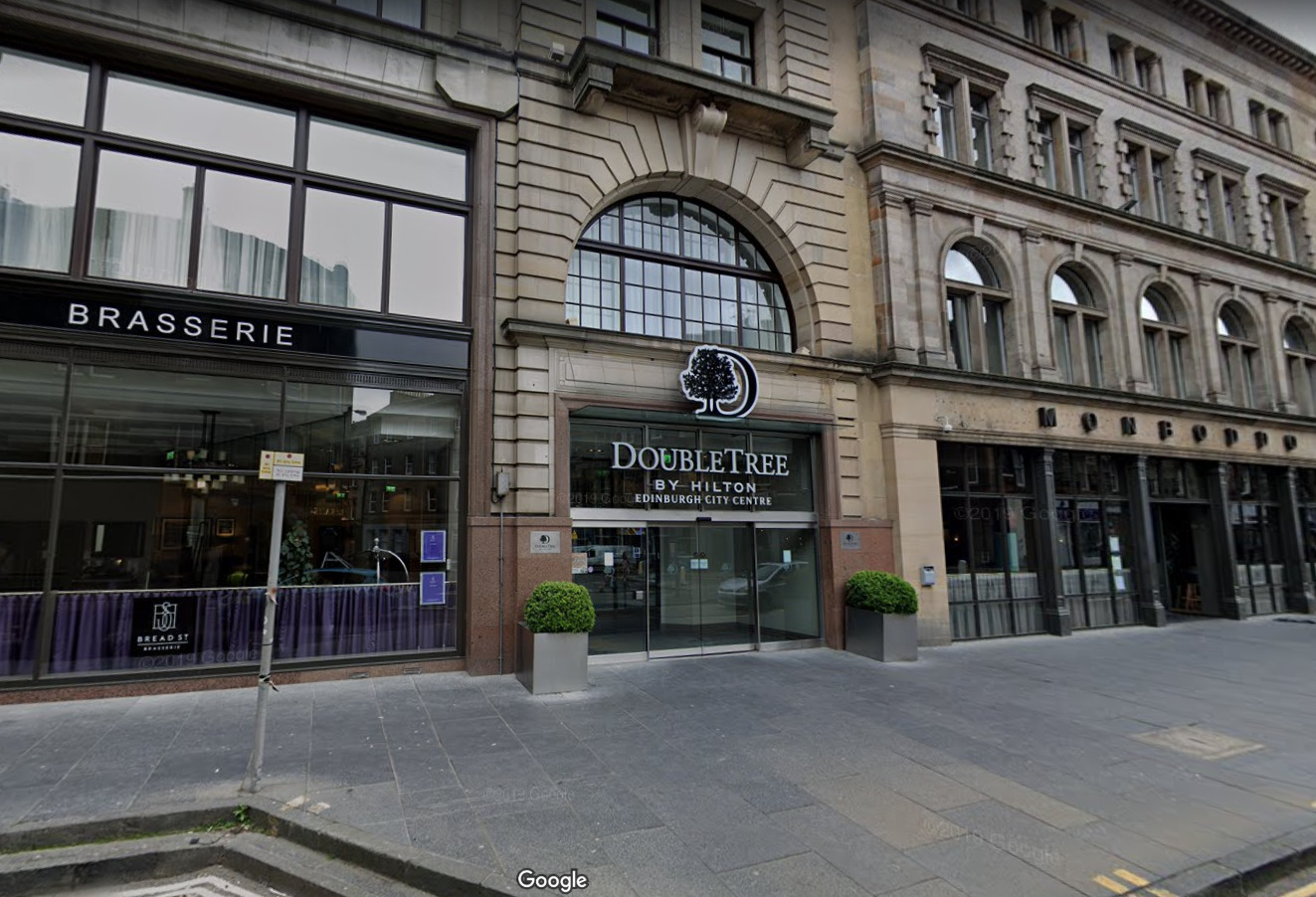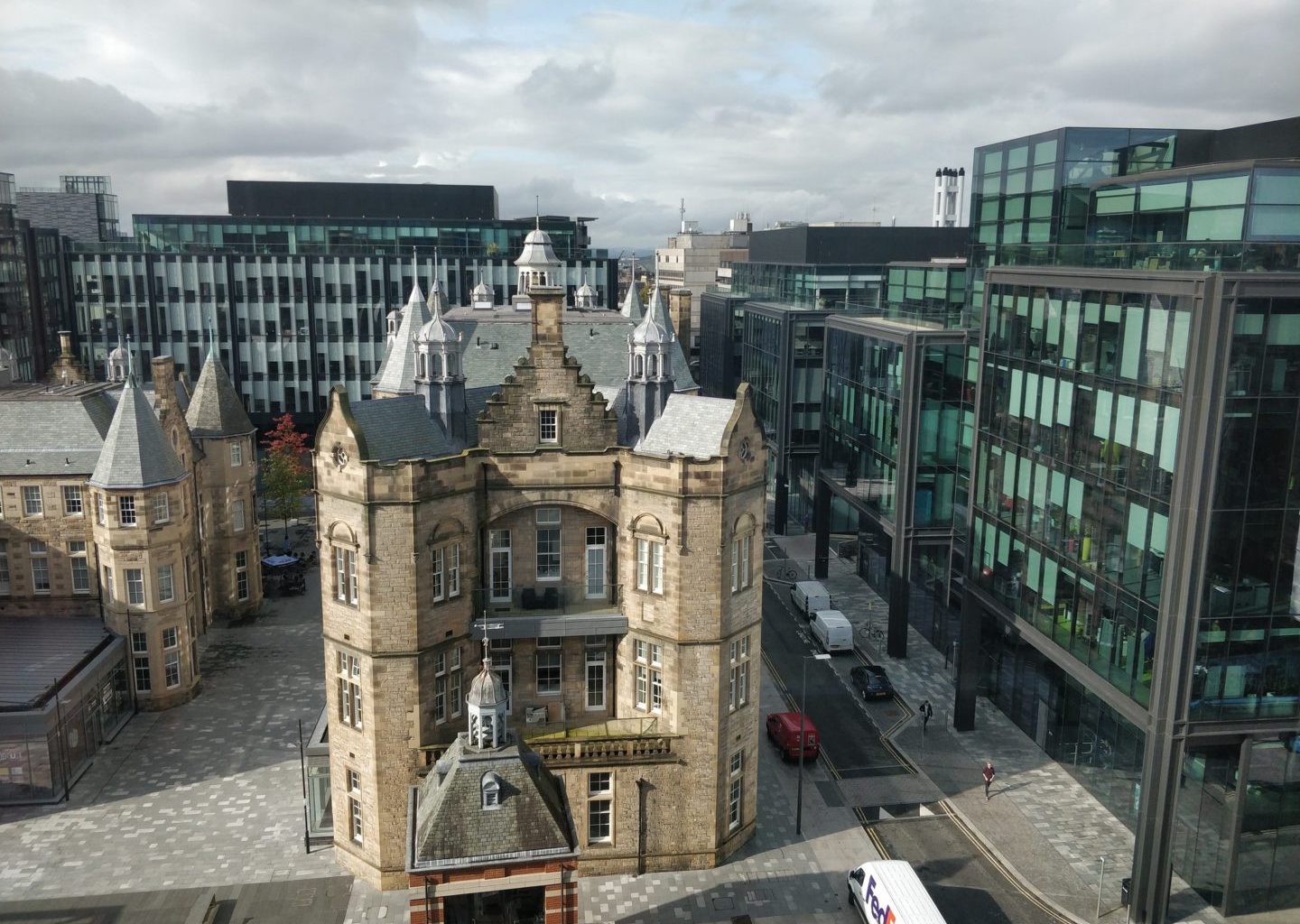Tax haven firms are buying up large swathes of the capital, with many of Edinburgh’s most iconic buildings now owned offshore, The Ferret can reveal.
Registers of Scotland (RoS) data shows that these properties, many of them worth tens of millions of pounds, are owned by companies incorporated in countries which are known tax havens. These include Jersey, Guernsey, Luxembourg, the Isle of Man and the British Virgin Islands.
The centre and west end of Scotland’s capital city have become hotspots for such premises, particularly the EH3 9 postcode district, which encompasses much of Tollcross, Lauriston and Fountainbridge. Our investigation found that many of the prominent buildings along Lothian Road are now owned offshore.
By the end of 2019, 42 offshore-owned properties had been bought in the area for a collective £291.7 million – the largest concentration in Scotland. Their value is likely to have since risen.
Many of the city’s best known hotels, including the Caledonian, the Sheraton, the Kimpton, and the Doubletree Hilton, as well as luxury apartment complexes like the Quartermile are now owned in tax havens.
Offshore-owned office blocks also play host to many notable tenants like the Scottish Government’s economic development agency and some of the biggest banks in the country. These include prominent commercial properties such as Standard Life House, Exchange Plaza, Saltire Court, Port Hamilton, New Uberior House, Exchange Tower, and Apex House.
Revealed: Scottish property worth billions owned by tax haven firms
Tommy Sheppard, the SNP MP, whose Edinburgh East constituency encompasses the EH3 9 district said that tax haven-owned property was “undoubtedly a bad thing for our city and our country”.
He said: “It is a cause for concern that so much commercial property is owned by unaccountable offshore companies. We need to improve regulation to ensure not only that these companies do not provide a safe haven for dirty money, but to oblige them to act within a public interest framework, putting the needs of the city’s residents before profit.”
Andy Wightman, a long time land ownership campaigner and Green MSP for the Lothians said it was an “appalling state of affairs” that much of Edinburgh’s property is owned in tax havens and “should not be allowed to continue”. He said offshore property owners were “profiting from unearned wealth and simultaneously denying our hard pressed public services much needed income.”
We recently reported that by the end of 2019, 3,237 Scottish properties were bought for a collective £4.42bn by companies based outside of the UK. Around 60 per cent were bought by companies based in tax havens.
Such firms can be secretive, with little or no public information about what the business does, how its income is earned, and the people who own and run it. Despite being registered offshore, such firms are commonly named after the building or street which is home to the property.
There is no suggestion that any of these companies are acting illegally, or indeed avoiding paying tax in Scotland and the UK by being based in tax havens. However, tax avoidance campaigners warn that opaque offshore firms are routinely used by criminals to buy property as a means to launder or stash dirty money, as well as to dodge tax.
Richard Murphy is a co-founder of the Tax Justice Network, a chartered accountant and professor of international political economy at City, University of London. He said that while there can be “commercially-valid reasons” for using a company to buy property, “that rarely explains why they would be tax haven-owned.”
Such ownership may be because the owner wants to remain anonymous and not disclose their interests, beneficial ownership, or be subject to taxes like capital gains, inheritance, and stamp duty, said Murphy.
For example, while property bought in an offshore firm’s name would be liable for stamp duty, the tax can be bypassed in any future property sales by changing ownership of the firm. By buying shares, the company’s new owner also takes ownership of the property. But by bypassing a traditional property transaction, stamp duty is avoided altogether.
While some offshore firms buy UK properties directly, others buy UK firms which already own other companies and properties in the UK, Murphy said. This adds “layer upon layer of anonymity” and “you certainly wouldn’t be able to trace the impact on tax paid as a consequence”.
Less information is required of UK-registered companies since David Cameron changed the rules in 2016, Murphy argued. “There was a time when we had a right to see all details and shareholdings and now we only have a right to see significant shareholdings”.

This story is part of our ongoing investigation into land ownership in Scotland.
The Ferret consults with our members on a regular basis about the issues that we should look into. You can get involved and help fund our next investigation by joining The Ferret.
He called on the Scottish Government to introduce legislation which would require offshore companies that own property in Scotland to register and file accounts here, declare interests in properties they own, and ensure taxes are paid.
“ are in our towns and cities, and we should be able to see what’s going on with them”, said Murphy. “This is an issue which should be part of Scottish political debate. Scotland is at risk of losing money as a consequence.”
The government previously told The Ferret that “everyone must pay their fair share of tax to fund the vital public services on which we all rely.” Using its existing powers, it has “ensured that this principle is at the heart of our tax policies”, a spokesperson said. “In addition, we are committed to transparency about who is making decisions about Scotland’s land.”
The government had brought forward “draft regulations for a new public register of controlling interests in land owners and tenants” to the Scottish Parliament for the second time in January. It hoped that regulations would be laid “for a third and final time” later in 2020, the spokesperson added. The government has also said it will not bail-out companies linked to tax havens.
Charlotte Square
Some 13 properties owned in tax havens sit in Charlotte Square, a UNESCO world heritage site home to the First Minister’s residence, Bute House, and the Edinburgh Book Festival. Ten of these properties are owned by the British Virgin Islands-incorporated property investment firm, Fordell Estates, which owns several properties in other parts of the city.
It is not known who the investors or controlling parties of Fordell Estates are. The firm’s property portfolio, called the Charlotte Square Collection, includes Wemyss House at 26-31 Charlotte Square, the former National Trust for Scotland headquarters. The conservation trust, which still owns Bute House, sold Wemyss House to Fordell for £8.75 million in 2009 after it reportedly ran into financial difficulties.
In 2013, a manager at Corran Properties, Fordell Estates’ Edinburgh-based development partner, told the FT that he wanted to return Charlotte Square to “the premier address for financial services in Scotland”.
Seven of the square’s interconnecting Georgian townhouses make up the Kimpton Hotel, formerly the Roxburghe, which was bought for £42 million by the Luxembourg-registered Roxburghe Investments Lux S.à r.l. The hotel’s parent company, InterContinental Hotels Group (IHG) confirmed that the Luxembourg firm is not an IHG company or subsidiary and that it did not directly rent the property from it.
Number 8 at Charlotte Square was bought for £2 million in 2010 by COFIP International Properties Limited, which is incorporated in the British Virgin Islands. Number 4 is owned by another British Virgin Islands firm, Horwich Investments Limited. Ownership of the property was transferred to the firm by another party for “good and onerous causes” in 2015.
However, according to the companies registry of the Jersey Financial Services Commission, Horwich was dissolved in 1989. RoS said there had been a pending transfer application over this title at the time the report was created. It confirmed the title was sold on in January to the Luxembourg firm, Scott’s Real Estate S.A. It has not been possible to determine the ultimate beneficial owner of any of these firms.
Caledonian Hotel
The iconic Caledonian Hotel which sits on the corner of Lothian Road and Princes Street was sold in 2008 for £56.4 million to the Guernsey-based Shilling Real Estate Limited. It was later bought by an Abu Dhabi firm, Twenty14 Holdings, for £85 million in 2018. RoS said that while it had no record of this sale, the sale may not have yet been submitted for registration.
The Ferret contacted Twenty14 to clarify the current ownership arrangements but received no response.
Standard Life House
The huge office building on Lothian Road was previously occupied by Standard Life Assurance Ltd, one of Scotland’s largest financial firms. The property was sold for £93.75 million, without VAT, to the Guernsey-based SLH Propco Limited in 2015 – the most expensive property transaction in the city.
A spokesperson for Standard Life Aberdeen plc confirmed that it sold the assurance arm of its business to the Phoenix Group insurance firm in 2018 and were no longer based in, or connected with Standard Life House.
Rutland Court
The large office block at next to Standard Life House sold for £14.75 million to Rutland Court Real Estate Ltd, which is based in the British Virgin Islands. There are numerous offshore firms with similar names in the British Virgin Islands, as well as other secrecy jurisdictions, according to the ICIJ Offshore Leaks database. However it is not possible to determine whether any of them are connected to Rutland Court Real Estate Ltd.
Exchange Plaza
In 2019, the huge office building was sold for £52.2 million, excluding VAT, to the Switzerland-based Swiss Pillar Investments AG. OpenCorporates lists the company’s main purpose as “to acquire, hold, manage and sell land in Germany and abroad”.
The Sheraton Grand Hotel
The prominent hotel at Festival Square was sold for £1.2 million in 1998 to the Jersey-based Monoceros Property Holdings Limited.
The firm is owned by the wealth management firm RBC Trust Company (International) Limited, a subsidiary of the Guernsey-based RBC Holdings (Channel Islands) Limited.
Saltire Court
The five-storey office block on Castle Terrace was sold for £67.6 million to the Jersey-based Tigon 7 Limited in 2017. Saltire Court is occupied by numerous investment, legal and financial services firms including Deloitte, KPMG, Martin Currie, and Dunedin.
A firm called Tigon Limited is registered in the Bahamas, according to information leaked to the International Consortium of Investigative Journalists. However, The Ferret has been unable to verify the beneficial owners of these firms, or whether Tigon 7 Limited has any relationship with the Bahamas firm with a similar name.
Argyle House

The Lady Lawson Street office block on is home to the CodeBase technology incubator, the NHS-run Veterans First Point Lothian and others. Argyle House, a prime example of “Brutalist” architecture, was sold for £34 million, before VAT, to the Jersey-based property investor Jupiter Argyle in 2014.
Quartermile

The towering high-end office blocks and luxury apartment complexes at the old Edinburgh Royal Infirmary site are among several Quartermile developments in the capital. In the former hospital grounds alone, offshore firms own property worth at least £110 million.
One Nightingale Way office block, Quartermile 4, was bought for £68.5 million in 2016 by the Luxembourg-based firm, Edinburgh Quartermile 4 S.à r.l. In 2017, the headquarters of Quartermile’s parent company Qmile Group at the nearby Lister Square was also bought by the Luxembourg firm, for £28.5 million.
The ultimate beneficial owner of the company cannot be confirmed, but The Scotsman reported that the property had been bought by UBS Asset Management in 2017.
The Anguilla-registered Juansrich Insurance Limited became the proprietor of three Simpson Loan flats 2012, and bought a further three in 2016, all for a collective price of £1.7 million. The similarly-named Juansrich Limited, based in Houston, Texas, also bought a flat on the street, and three more around the corner on Nightingale Way for nearly £3 million in total.
Other tax haven-based firms own one-to-two properties on Simpson Loan, with the majority based in Hong Kong.
Doubletree Hilton

The hotel on Bread Street was bought for £24.3 million by the British Virgin Islands-based Redefine Hotels Edinburgh Limited in 2014. Other Redefine firms own Edinburgh’s Milton Link retail park and a property at 7, Lochside View. The premises are worth £11.2 and £13.3 million respectively.
A 2019 report from the property investment business RDI REIT plc stated that it had 82.5 per cent effective ownership of Redefine Hotels Edinburgh Limited and several other Redefine hotel firms.
RDI REIT, which is listed on the London Stock Exchange, has a head office in the UK capital, but is registered in the Isle of Man. The Ferret asked the firm to comment on its use of offshore structures, but did not receive a response.
New Uberior House
Adjoined with Princes Exchange, the prominent office building on Lothian Road houses Lloyd’s Banking Group, as well as its subsidiary, the Bank of Scotland and others. It was sold in 2014 for £61.7 million, excluding VAT, to the Jersey-based New Uberior House Limited.
According to an acquisition document, the share value of the company that owns the property was sold for £71 million in 2018 to a subsidiary of British Virgin Islands-registered MAS Real Estate Inc. The firm also owns much of the capital’s New Waverley development.
Nova House
The Tollcross office block on Ponton Street was sold for £5.5 million to the Jersey-based Al Jubran Limited in 2014.
Exchange Place offices
The offices at 1, Semple Street were bought by the Luxembourg firm, Exchange Place S.à r.l. for £47 million in 2017.
Quay2
The Quay2 office block at Fountainbridge was bought for £23.7 million by the Guernsey-based real estate firm Black Needle Limited in 2016.
160, Dundee Street
The office block, branded as OneSixty, was bought for £12.7 million in 2010 by the Guernsey firm, NPV Edinburgh Limited. A 2016 news release said that UK real estate firm APAM had bought the building for £9.6 million.
RoS said it had no record of this sale and that no sale applications were pending, but that the agents acting for the purchaser may have not yet submitted it for registration.
Port Hamilton
Best known for being the headquarters of Scottish Widows, a subsidiary of Lloyds Banking Group, the Port Hamilton Offices at 69, Morrison Street were sold for £91 million, excluding VAT, to the Guernsey-based Hamilton Propco Limited.
According to Deadline News, the purchaser was a private client of HSBC Private Bank and had let the property in its entirety to Lloyds Bank plc as part of a 25-year lease. In 2017, ownership of the property was transferred for just £1, plus VAT, to fellow Guernsey firm, EP 3 Devco Limited.
Conference House
As the name suggests, the office block at 152 Morrison Street is close to the Edinburgh International Conference Centre. Conference House was bought for £2.5 million, excluding VAT, by the Jersey-based Raag Edinburgh Limited in 2018.
Exchange Tower
The towering office building houses clients such as the Russian news outlet, Sputnik, The Royal Bank of Canada and the Montagu Evans property consultancy. Exchange Tower was sold to Jersey firm, KW Office SPV 2 Ltd for £13.5 million, without VAT, in 2015.
A 2018 end of year financial statement from US global real estate investment firm, Kennedy Wilson, lists KW Office SPV 2 as one of many of its Jersey-registered entities.
Apex House
Another huge office block at Haymarket Terrace, this building houses public sector tenants, including the Scottish Government’s economic development agency, Scottish Enterprise. In 2015, it was sold for £25.7 million, before VAT, to the Luxembourg-based Apex 123 Edinburgh S.A.R.L.
Asked about its use of the tax haven-owned property, a Scottish Enterprise spokesperson said: “Apex House has been Scottish Enterprise’s home in Edinburgh for many years and our tenure pre-dates this sale significantly.”
There is no suggestion of wrongdoing by any of the companies highlighted.
Header image by Ally Tibbitt.
Update: We published this article on 25 June at 13:10. We updated the article on 26 June at 11:20 to remove a listing of Enterprise House on Earl Grey Street after Registers of Scotland informed us that some of the entries in the data it had supplied us with were outdated. Some properties, including Enterprise House, had been sold on to companies not based in tax havens and should not have been included in the original data set. We also removed an inaccurate mention of the number of offshore-owned properties in the Lothians.















Shocking, concerned agents should compare notes with Barcelona, for example, where one firm is even suing a Councillor.
But begs the question of Edinburgh City Council stance on built and landscape heritage, including Princes Street Gardens. Is heritage really safer in current LA hands?